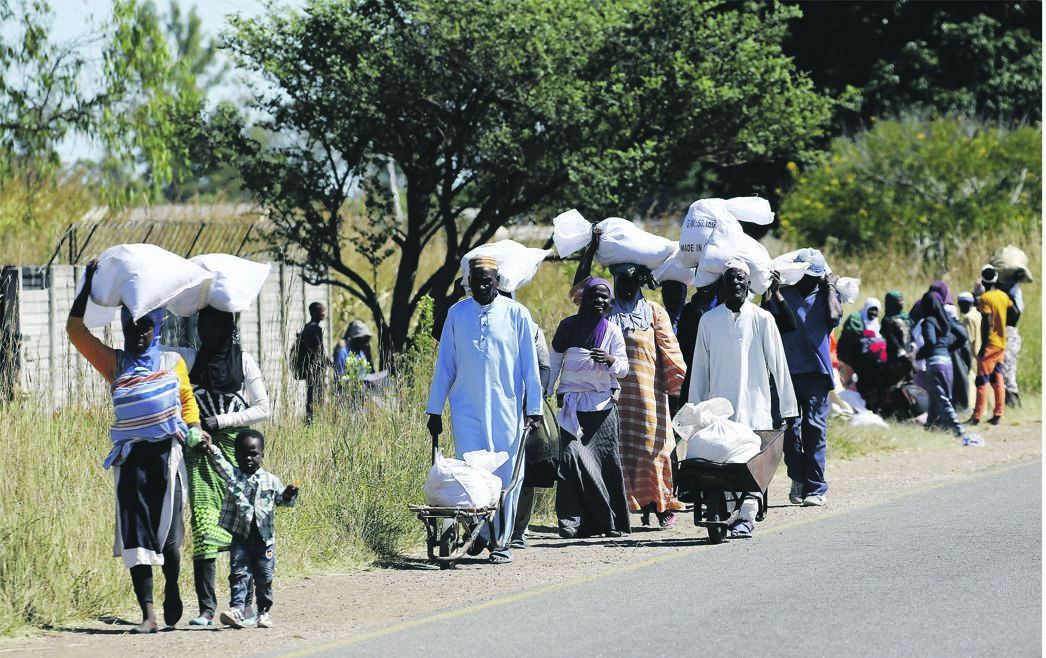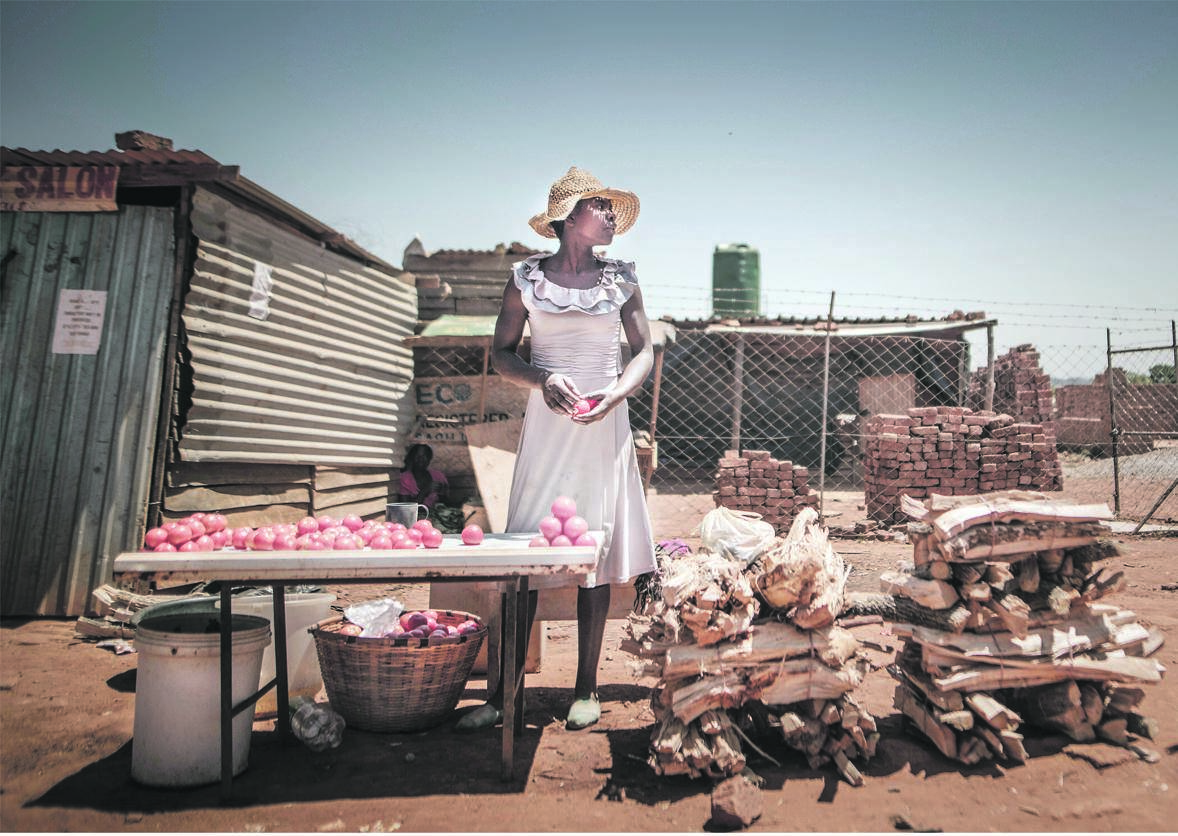
Citizens who were already battling to make ends meet before the lockdown are resorting to flouting regulations to keep food on the table
A low-pitched whistle blown from about 3km away is the first signal for informal traders and currency dealers in the dormitory town of Chitungwiza, 30km south-east of the capital Harare, to get ready to run away from police and military officers enforcing Covid-19 coronavirus lockdown measures in Zimbabwe.
A second high-pitched whistle is the red-light signal that the lockdown enforcers are close by and that everyone has to immediately vacate vending and currency trading positions and run for their lives.
Such is life in the townships of Zimbabwe, where it has become a daily toil for survival for the majority of the country’s urban unemployed populace who rely on daily informal trade and deals.
“The first whistle is for people to get ready because the police and army trucks may go in a different direction and away from our zone,” a 34-year-old man who sells small packs of potatoes by the roadside in Chitungwiza told City Press.
“But when the second whistle, which is high-pitched and long, comes, it means the security officers are in our zone and people have to immediately run.”
Life under lockdown has become unbearable for many in urban townships as they are unable to generate any income.
Moreover, government pledges of financial and humanitarian assistance have not materialised for the majority, who say they have run out of food stocks.
Read: Zimbabweans enter Covid-19 lockdown amid severe economic crisis
Zimbabwe extended its initial three-week-long lockdown by a further two weeks, which ended on Sunday, as President Emmerson Mnangagwa’s administration tries to contain the spread of Covid-19.
“Lockdown means that we will starve and I cannot watch my children go hungry, which is why I have to come out here and risk it all to sell vegetables. At least the farmers’ markets are open and we can buy in bulk for resale here in the township locations,” a vegetable vendor, who only identified herself as Edna, said as she served her clients at the Unit L Shopping Centre in Chitungwiza.
“We have heard of cases of Covid-19 from Mhondoro and Murehwa, and we are starting to get scared because these are cases away from those returning from the US and the UK, but there is nothing we can do,” she added.
Midway through the interview, the first low-pitched whistle sounds and she immediately packs up her stock.
After a one-minute interval, the second whistle sounds and everyone runs for cover, disappearing into nearby residential areas and a few closed smaller shops that magnify the longish sunset shadows of nearby trees.
About six armed military personnel disembark from a van, accompanied by a five police officers.
They shout instructions for people to stay indoors and make a few rounds before returning to their trucks and leaving.
But as soon as they turn the corner, the street vendors are back on the streets, restarting what has become a daily struggle for survival in these hard times of the Covid-19 pandemic.
Other outlets such as shebeens, barbers and dealerships have been opening despite clear lockdown regulations prohibiting their operation.
However, Home Affairs and Cultural Heritage Minister Kazembe Kazembe appears to be aware of this, saying on Thursday that this trend was cause for concern during national efforts to contain the further spread of the virus.
He said he was concerned about “some members of the public who are disregarding the lockdown measures” by continuing to gather around central business districts, shopping centres and residential areas.
“This poses a serious risk to the individuals concerned and the public at large … It militates against government efforts to manage the pandemic and, therefore, there is a requirement that people desist from such tendencies.
“We are equally disturbed by reports of people who are having parties at home, operating shebeens and some who are drinking beer in groups while closing themselves inside bars and bottle stores,” said Kazembe.
As many as 15 545 people have already been arrested throughout the country for various offences relating to violating Zimbabwe’s lockdown regulations, Kazembe added.
In rural areas, social norms have been disrupted and this is disturbing villagers, who can bear the restrictions no more.
The dead have to be buried speedily and social mourning gatherings have to be small.
Some rural areas in Zimbabwe are also smarting after an outbreak of malaria, with one malaria patient from Murehwa, about 90km from Harare, also testing positive for Covid-19.
In Mutoko, about 150km from Harare, the 60-year-old friend of a family that is preparing for the burial of a relative has just been to the Mutoko District Hospital where her daughter has been discharged after being treated for malaria.
She arrives at the funeral just before midnight and tells City Press: “She has been discharged; we feared the worst – that it was Covid-19 – but we are relieved that it is only malaria. I have only managed to pay half of the hospital bill.
“I am hoping that my duties as a sahwira [a traditional clan friend who can ridicule or make jokes at a funeral] will help me raise the balance,” she jokingly adds.
All Zimbabwean deaths and hospital admissions now have to be tested for Covid-19 in line with new government requirements. However, this is also clogging government hospitals as it can take up to three days to get the green light for burial after the release of test results.
Senior doctors in Zimbabwe want the government to step up testing for Covid-19 by deploying resources to kick-start community testing.
They are also pressing for the mandatory wearing of masks and for returning citizens to be kept in quarantine for longer to limit associated risks of further contamination.
This follows reports that the government was releasing returning citizens under quarantine earlier than recommendations set out by the World Health Organisation (WHO), which some government officials argue is necessary as a way of decongesting quarantine centres.
In a letter to Health Minister Obadiah Moyo this week, Dr Shingai Nyaguse wrote: “We do urge the ministry of health to make use of this time during the lockdown to maximise the testing and identification of Covid-19 cases. The current lack of testing at community level might prove to be a missed opportunity.
“We are concerned with the reduction of the quarantine period to an effective eight days, which is contrary to the WHO recommendations.”
As Zimbabweans battle for survival in the face of the Covid-19-induced lockdowns, the elderly population appears to be suffering the brunt of the pandemic as they are unable to fend for themselves.
A few parliamentarians have been able to provide some relief for the elderly, although most of the aid has been distributed along political and partisan lines.
But, for the majority of Zimbabweans, young and old in urban and rural areas, life under lockdown is proving to be a daily tussle for survival.
And it seems it will be like this for a long time to come as Covid-19 infection numbers continue to rise, with winter set to worsen some associated conditions such as pneumonia, according to medical doctors.
TALK TO US
How has the lockdown affected your means to make money and feed yourself and/or family?
SMS us on 35697 using the keyword LIVELIHOOD and tell us what you think. Please include your name and province. SMSes cost R1.50. By participating, you agree to receive occasional marketing material.
 | ||||||||||||||||||||||||||
Get in touchCity Press | ||||||||||||||||||||||||||
| ||||||||||||||||||||||||||
| Rise above the clutter | Choose your news | City Press in your inbox | ||||||||||||||||||||||||||
| City Press is an agenda-setting South African news brand that publishes across platforms. Its flagship print edition is distributed on a Sunday. |




 Publications
Publications
 Partners
Partners









